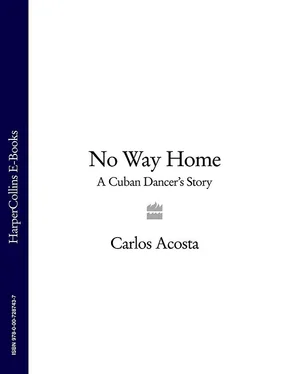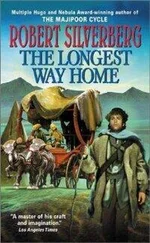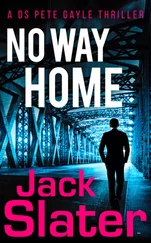Most of the time their conversations revolved around me: they argued continually over how to sort out my future while I continued break-dancing in Vieja Linda and spending my time at street parties. My father swore that he would thrash me to within an inch of my life, but I did not care. I just went on doing what I liked until one day my father happened to bump into our neighbour Candida on the stairs.
She was a good woman with a strident voice who was very much involved with the revolutionary process. Her nephew was one of the principal dancers with the Cuban National Ballet and her two oldest sons Alexis and Alexander went to the Alejo Carpentier School of Ballet, which was situated on the corner of L and 19 in the downtown district of Vedado. When my father started telling her about my exploits, Candida had a suggestion.
‘You say he likes dancing? Why don’t you send him to ballet school then?’
My father’s eyes lit up. ‘Ballet!’ he said and for an instant he was transported back to the cinema where for the first time ever his soul had taken flight. His heart started to beat rapidly as it had on that distant day and suddenly there was hope. He did not think twice: he thanked Candida, said goodbye almost before she’d finished her sentence and raced up the twenty or so steps to our apartment at the speed of light to tell my mother about his new idea. They considered each and every possibility, then together they sat down to wait for me.
Even though I was only nine, I can still remember that day very well. I had just got back from one of my usual break-dance practice sessions. As I went up the steps to the apartment I could see that the door was wide open and a weak light illuminated the interior where my parents were preparing to give me, so they said, some very good news.
‘Sit down, we’ve got something to tell you!’
There was something unusual about my father’s tone and I sensed that something strange was going on. His words unsettled me. What could it be about? I sat down nervously.
‘So you like to dance, eh? Well we’re going to enrol you in a ballet school,’ announced the old man.
‘Ballet? What’s that?’ I asked, perplexed.
My father shot a conspiratorial glance towards my mother, who was looking somewhat flustered, and said:
‘Well, um, it’s, um, it’s the dance of the parasol ladies.’
When she heard this definition my mother collapsed into giggles which lifted the tension for a moment.
‘What, that boring thing that they put on the telly?’
‘Yes, that’s it!’
‘But Papi, I’ve told you loads of times that I want to be a sportsman. Anyway, you know that kind of dancing’s just for women.’
‘A sportsman? Don’t make me laugh! If you go on like you are, the only thing you’ll be is a waster! Running around with those gangs, spinning around on your head … One of these days you’re going to break your neck.’
‘But what’s everyone in the neighbourhood going to think? They’ll say I’m gay!’
‘Listen, you’re my son and the son of the tiger shares his father’s stripes. If anyone calls you gay, just smash his face in, then pull down your trousers and show him what you’ve got between your legs.’
‘But Papito, I want to be a footballer!’
‘Your mother and I have made up our minds and that’s that. It’s your future, my boy!’
My father ground his false teeth, his face fixed in that grim expression that told me the conversation was at an end. And so it was. They had decided my career for me. I had to put my dreams of being a footballer to one side and dedicate myself to the dance of the parasol ladies .
‘What now?’ I asked myself. And what was everyone in the neighbourhood going to say when they found out that El Moro had become a ballet dancer?
A week later, Mamá took me to the audition. We had to catch three different buses to get to the ballet school at L and 19. She was chain-smoking, puffing away like a chimney; she had a cigarette in her right hand and was holding on to me with her left. I loathed the smell of tobacco but I kept quiet. I was happy and proud to be travelling with her in her dark glasses, which only served to enhance her beauty. It was certainly more relaxing than going with my old man. During the journey I tried to explain to her that it really was sport that I liked best, and pulled my saddest, most pitiful face. I knew that playing the victim usually worked with my mother, but on this occasion my attempt failed.
There were a lot of people and a lot of cars near the school’s three-storey building, which was still bright and colourful at that time. At the entrance there was a garden with a well-kept lawn and all sorts of plants: ferns, roses and hibiscus. And there was I, unable to fight any more against what now seemed inevitable.
We went in and joined the queue. I looked around me. Most of those there, the men as well as the women, were very well dressed and with a certain air of refinement about them. The gulf between us seemed enormous. People looked at my mother and me with curiosity, trying to work out what the connection was. She was blonde with delicate features, and I was a sort of cappuccino colour. I hated those looks, the ones that seemed to be saying to me subtly, ‘Go away, you don’t belong in this place.’ A haughty-looking man fixed his eyes on me. He did not say a word but the message was clear, ‘You must have made a mistake. This isn’t a centre for Afro-Cuban dance. They teach ballet here, understand? It’s a ballet school.’ I smiled ingenuously at him as a harsh unmelodious voice shouted out: ‘Carlos Junior Acosta Quesada!’
I went through to studio number three and was instructed to take off the shorts I was wearing. As I stood there in my coffee-coloured swimming trunks, the only ones I owned, a tall woman said to me sweetly, ‘All right then son, lift your leg up.’
Never in my life have I felt such pain. That woman, apparently so gentle, yanked my right leg up with such force that I can still feel the sharp, stabbing agony that ripped through the back of my thigh as she grabbed it, and then shot on into my tendons and abductor muscles. A large woman and three other judges sat jotting down notes on my torment.
‘Okay son, stretch your foot out.’
I did it as well as I could. The four women looked at each other then wrote something down again.
‘Now jump as high as you can,’ one of them ordered me.
I started to jump up and down like a rabbit until they said, ‘Fine, that’s enough.’
My mother remained outside throughout, watching with great attention through the glass. I do not know what was going through her head, if she was proud, confused or simply thought that we had made a mistake in coming.
After they had manipulated me like an automaton on which they were experimenting, they then set me the most difficult test.
‘Right son, now it’s time for you to improvise something for us.’
‘Sorry, to what?’
‘We would like you to dance something for us so that we can see your imagination at work.’
I knew how to break-dance very well. I was not the famous Moro de Los Pinos for nothing. I started to do some moves with my torso and stomach, which always led to whoops and yells of admiration every time that I performed them at street parties. I saw that the teachers were looking at me with their eyes popping out of their heads, and decided to do something to really impress them. I was just about to spin round on my head when all four women rushed towards me shouting, ‘No! No! Don’t do that, you’ll kill yourself!’
They returned me to a more human position, both feet planted firmly on the ground, and the largest lady tried to explain.
‘Look, we just want you to pretend to be a cook, for example, or a huntsman, something like that. Understand?’
Читать дальше












